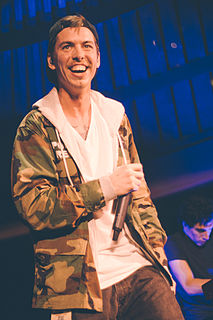A Quote by Shaun Tan
I actually started out as a writer and then converted to illustration because I realised that there was a dearth of good illustrators in genre fiction, at least in Australia at that time.
Related Quotes
I started out in graduate school to be a fiction writer. I thought I wanted to write short stories. I started writing poems at that point only because a friend of mine dared me to write a poem. And I took the dare because I was convinced that I couldn't write a good poem... And then it actually wasn't so bad.
Creative non-fiction is such a liberating genre because it allows the non-fiction writer, whether he or she be journalist or essayist, to use all of the techniques of the fiction writer and all of the ideas, creative approaches, that fiction writers get a chance to use, but they have to use it in a true story.
I went to school in California, at Stanford when I was seventeen, and I lived in San Francisco until I was twenty-three, and then I lived in Hungary for, like, a summer, and then I went to Iowa for three years. At Iowa, I actually did the fiction program, not poetry. I was a fiction writer for a long time before I was 'out' as a poet.
Art is for the elite because it has a very high price-point of entry. And when one is in that social strata, they look down at illustrators because they just draw things directly for a few hundred dollars and that's seen as being a bit grubby. Galleries allow artists to stay relatively divorced from the financial aspects of their trade. I am lucky because I do fine art, and that is half of my living. And then illustration provides the other half.
I was trained mainly as a short story writer and that's how I started writing, but I've also become very interested in non-fiction, just because I got a couple of magazine jobs when I was really poor and needed the money and it turned out that non-fiction was much more interesting than I thought it was.
Australia, most of the filmmakers there write a film and they direct it. There's a lot of writer/directors there, because nobody wants to write a script and then let it go when they've had that much of a personal investment to it, because you're not getting paid huge amounts of money in Australia to direct.
The Booker thing was a catalyst for me in a bizarre way. It’s perceived as an accolade to be published as a ‘literary’ writer, but, actually, it’s pompous and it’s fake. Literary fiction is often nothing more than a genre in itself. I’d always read omnivorously and often thought much literary fiction is read by young men and women in their 20s, as substitutes for experience.
I remember going through school and doing art, which was the only thing that I actually found fulfilling, and I couldn't really figure out why. Then I got into college and started messing around with photography, and I realised that it was about getting the images that were in my head out in a way that didn't have to be spelt correctly.
Good writing is good writing. In many ways, it’s the audience and their expectations that define a genre. A reader of literary fiction expects the writing to illuminate the human condition, some aspect of our world and our role in it. A reader of genre fiction likes that, too, as long as it doesn’t get in the way of the story.







































